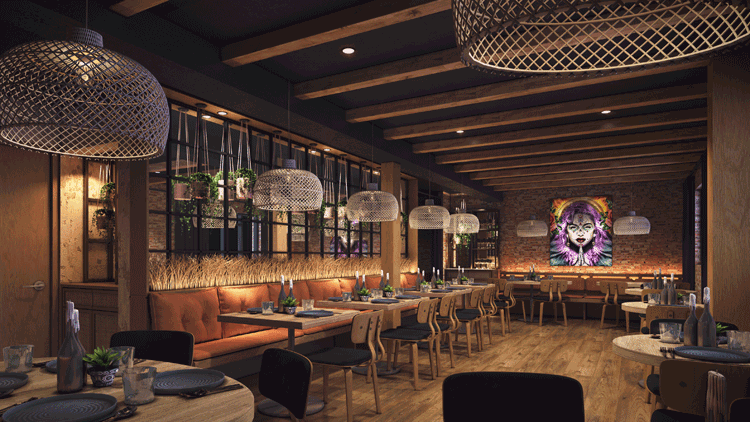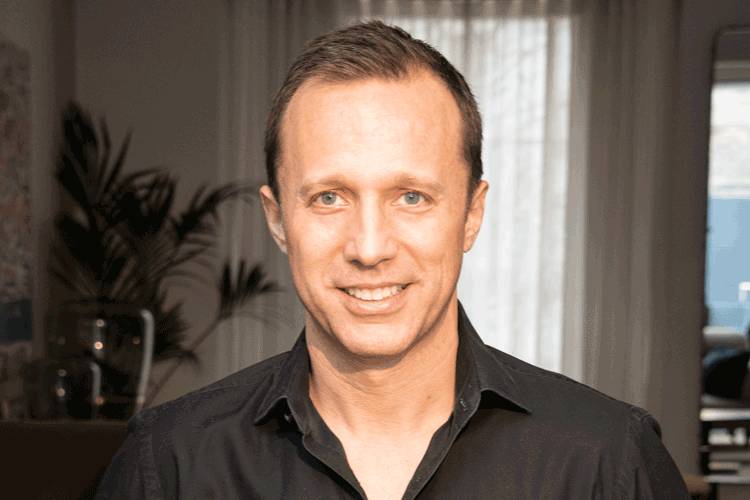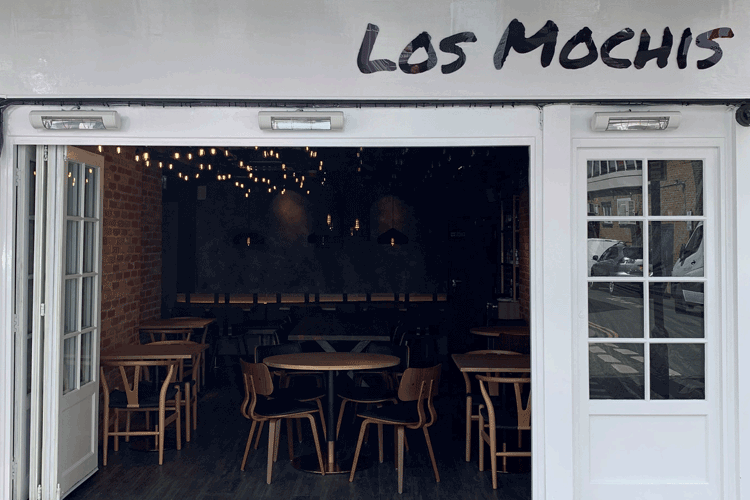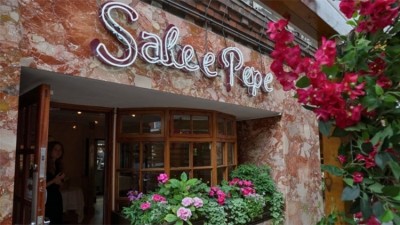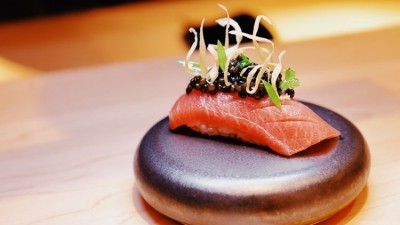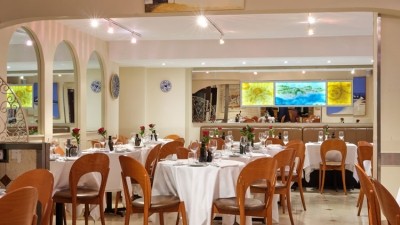Taco stand: Markus Thesleff on opening Mexican/Japanese restaurant Los Mochis
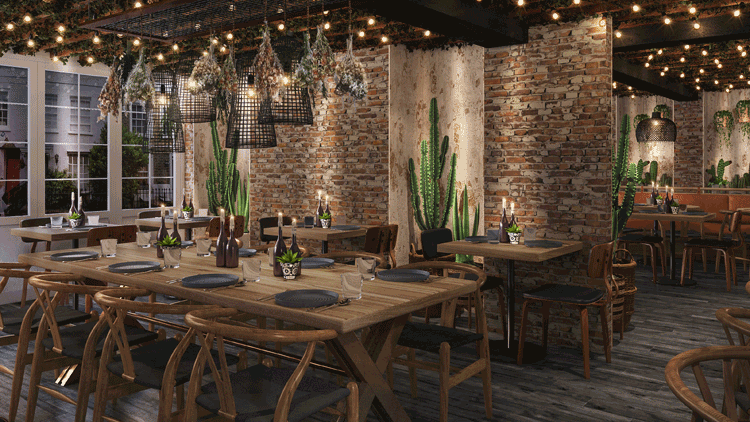
“Everything’s possible right? As long as it’s funny, crazy and different.” So says Markus Thesleff, having just come to the end of a long story about jellyfish (which we’ll come to in a bit) to illustrate his point.
We’re at Soho House White City to talk about Los Mochis, Thesleff’s Mexican/Japanese hybrid restaurant and bar that shares its name with a city in Sinaloa, Mexico, due to open in London’s Notting Hill this month - having been delayed by the second lockdown late last year. With its 22-strong ‘gangster taco’ menu (more on that later as well) and an approach to cuisine that is described as ‘mixing Mexican spirit with Japanese elegance’, fun and different are words that certainly spring to mind (and maybe also crazy for trying to open a restaurant in the current climate).
Thesleff himself is also fun as I discover when we meet over coffee (and subsequently lunch and then post prandial drinks) to talk over his plans – and also at a later date when the restaurant is close to completion. The nightclub owner turned restaurateur is back living in London having carved out an impressive career in the Middle East - most notably in Dubai - and he’s not short of anecdotes of the past few years, many of which turn out to be unprintable (especially the one involving chillies on the day of one particular restaurant launch).
Making a mark in Dubai
Born in Finland, Thesleff moved to London in the early eighties before relocating to the US to go to university. Following that, he returned to London to work for his family’s food business before entering the world of hospitality in 2001 when he opened nightclub Pangaea - named after the supercontinent that existed during the late Paleozoic and early Mesozoic eras - firstly in New York and later in Marbella and London (the London venue, located in what is now the basement of Mayfair restaurant Hide, hit the headlines when a then 20-year old Prince Harry got in a scuffle with a paparazzo after leaving it).
Yet it is in Dubai that he really made his mark, first with contemporary Japanese restaurant OKKU - named after the nickname his nanny gave him when he was three-months old - located in the H Hotel, which opened in 2009. With OKKU, Thesleff went head to head with the likes of Nobu and Zuma, channelling the dark and opulent interiors and modern fusion food that made both brands international hits, and came out favourably, winning numerous awards as a result.
There followed BBQ and crab shack CLAW, which he describes as the first “red neck BBQ joint in the Middle East”, as well as the concepts Casa de Tapas, modelled on the rustic bodega style venues in the alleyways of Madrid but through a Dubai lens (so a huge bar, spacious modern dining room and large terrace) and Sophie’s Café, a healthy eating spot for the Gen Z crowd. With a diverse and ambitious portfolio, Thesleff seemingly had the knack of knowing what Dubai diners wanted just before they did themselves.
“In a city such as London, you have to be on
your game, but maybe just better,
faster and tighter"
It is with OKKU where the jellyfish come in. Such is the need for excess in Dubai and wanting to stand out, Thesleff hit on the idea of bringing the world’s biggest jellyfish tanks into the hotel restaurant, a process not without its difficulties. These, he says, included having to reinforce the floor of the dining room so it could take the weight of the two eight-metre long fish tanks and taking apart the front of the building so that they could be installed.
Once in situ, the challenges continued. “In Dubai jelly fish are not considered fish, they are considered invertebrate and each one had to have a visa,” he recalls with a grin.
“Each visa cost $180 (although he managed to haggle customs officials down to $130 each) and I had 120 jellyfish, so you can imagine the cost.”
It also turned out that these particular jellyfish had a lifespan of just a matter of months, meaning they had to be replaced regularly. Not only that, but the jellyfish that made it to the tanks weren’t eating the food given to them, meaning a mini farm had to be set up in the back bar to grow lobster eggs that were then fed to them using squeezy bottles.
“This worked, but then the hotel was like ‘we want people to see them from the hotel’,” Thesleff continues. “But all the lights in the hotel didn’t let them sleep so they died, meaning we needed more jellyfish. But by this time we couldn’t get them because they were now too far out to sea in Japan or Sri Lanka where we got them from, so the restaurant team had to go out to the beaches in Dubai with saucepans to catch them.
“This is all stuff that would have been good to know before we started.”
A colourful launch
The travails of keeping jellyfish in Dubai might not, on the face of it, have much to do with launching a restaurant in London, but rather than regretting the tricky endeavour (and the numerous jellyfish that perished), Thesleff seems to regard the episode as a badge of honour. As an episode it has also informed his future projects.
In the case of Los Mochis, the ‘jellyfish idea’ is simpler but still not exactly what you would call straightforward. In an attempt to breathe some life into the Notting Hill building, which was previous home to Mark Fuller’s posh fish and chip shop Geales, and at the risk of enraging the neighbours, he is commissioning a Mexican artist to adorn the outside of the building with bright Mexican murals and motifs. It might not be to everyone’s taste, and Thesleff is anticipating some local backlash for the artistic endeavour, but like the jellyfish tank it’s his way of saying ‘I have arrived’.
At this point you could be forgiven for thinking that Thesleff’s venues, like much of Dubai, are all fur coat and no knickers. Yet beyond the showy exterior is a keen restaurant brain.
Moving back to London in 2018, he eventually parted company with his successful hospitality business Whissle, which he co-founded and was managing director of, in order to set up Thesleff Group, a private family holding focused on hospitality, leisure, and retail. Los Mochis will be his first venture in this new capacity, but you can bet a lifetime’s supply of jellyfish it won’t be his last.
In the time since his return he has done his homework and has also tuned into gossip (some of it salacious) about the London restaurant sector and the current Government’s dealing with hospitality. When asked what it feels like to be opening during a pandemic his phlegmatic response is that it is the same as any other time. “In a city such as London, you have to be on your game, but maybe just better, faster and tighter [because of Covid]. You can’t afford to waste budget because you don’t know what might happen tomorrow.”
He also believes that even though the economic climate might not be ideal, restaurants are more protected than other sectors. “People stop spending on high-cost capital goods like cars and houses and instead look for instant gratification. Although they might not go out as often as previously, when they do, they tend to spend more in order to make themselves feel better.”
“I want to be able to compete with my peers –
it is really important to me that I can show
I can do a good job here. I want to contribute"
With this in mind, Los Mochis is targeting the space between ‘elevated casual’ and fine dining, an experience he believes people will want more than ever once lockdown restrictions have finally been lifted. The idea is to combine Mexican flavours and spirit with Japanese elegance in what are described as ‘hands-on fun’ classic MexiCali dishes featuring Asian ingredients.
So to the gangster taco menu, which will include the likes of the Trailer Park KFC (Korean fried chicken, Napa cabbage, jalapeno, spicy pickled cucumber, pico de gallo, pickled onions, cheese, poblano sauce) and miso black cod (den miso, pickled cabbage, crispy onions) as well as those made with lobster and waygu beef.
“They are Californian style tacos; they are very moreish with loads of umami. They are not supposed to be authentic but fun. The tacos are the canvas and then we’re painting on top of that.”
Alongside will be dishes including ceviches, tostadas, tiraditos and quesadillas as well as a selection of maki rolls, while desserts will have a more Latin American bias with the likes of churro ice cream sandwiches; chocolate taquitos; and dulce de leche cheesecake - with a comprehensive list of tequilas and mezcals with which to wash things down. The neighbourhood location means it will do breakfast, serving the now de rigueur acai bowls and truffled scrambled eggs among other things.
The restaurant's menu is also completely gluten free, although Thesleff isn't promoting this fact.
Part of the new venture will be the Los Mochis Gives Back project, which will see the restaurant provide a meal for the less fortunate and vulnerable for every one purchased by a diner.
In addition to this, Thesleff is partnering with Buses4Homeless, a charity that refurbishes decommissioned buses into spaces for eating, sleeping and Learning in order to re-engage homeless people back into the community. Kitchen teams will prepare meals during the early morning downtime, which will then be distributed to the charity.
Building in the capital
Though very Notting Hill in its approach, the west London district wasn’t the first choice of location for Thesleff’s return to the capital. He initially had his sights set on Soho, and while he has opted for a more neighbourhood location given everything that’s happened with the pandemic, it’s a place he insists he will revisit.
“I was really keen on Beak Street and Wardour Street. We will do Soho, but at the moment the opportunities are not quite there.”
The early plan was to have three Los Mochis open by the end of this year - although the protracted lockdown will likely have set this back somewhat - with Thesleff promising “a couple of other very fun projects to come”. As he did in Dubai, his intention is to stamp his mark on the English capital and prove he can succeed in a very different market.
“I want to be able to compete with my peers – it is really important to me that I can show I can do a good job here. I want to contribute. There are too many people fighting over getting a bigger slice of the pie. I focus on making the pie bigger, because then when the tide comes in all boats rise.”
He is critical of what he calls the ‘broken’ casual dining system with businesses forced into undertaking CVAs to stay alive. “What Covid has done is exposed things – too many operators who grew too fast or in the wrong way and didn’t keep their DNA. There are brands that didn’t believe enough in quality and they certainly didn’t believe in people. It’s not entirely their fault, a lot of money entered the market.
“There’s some brands you can have a lot of and some you can’t. They outbid each other for dumb shit sites and if you went back to the same operators and said, ‘it’s your money, would you have done this site?’ they wouldn’t touch it. And then they turn around and say we’ll do minimum wage and pay out of tronc. What does that brand stand for? Everything we do is about creating brands, and the brand is the people who work there.”
By contrast, Thesleff describes the deals he is currently negotiating with landlords as “fantastic” and says he is also looking at larger opportunities if they come his way.
“This is the biggest opportunity of our generation. There are three of four projects I want to do in London. For me London is the centre of the culinary world and has been for a number of years. The best way I can contribute is by creating business and jobs.”
Playing it differently
When we meet again six months later in Notting Hill, with the restaurant on the cusp of opening, job creation is still on Thesleff’s mind, but maybe not in the way he had imagined. Like many in the industry there has been a struggle to find staff thanks to an exodus from the industry brought on by Brexit and the ongoing pandemic, and Los Mochis has not been immune.
Other obstacles exist, but like the employment issue they are not insurmountable. An outside terrace he wants to open remains untouched because of issues with the neighbours, one of whom even tried to stop Los Mochis from serving tequila and mescal because it wasn’t listed as a spirit in the drinks licence above the door.
The building itself has been whitewashed and looks smart and sharp, but the Mexican daubs are on their way to bring some additional colour to the neighbourhood, he promises. Given all that’s happened in the past 12 months, and the pushback from some of the locals, is there not a part of him that wants to just leave it as it is and play it safe? He seems genuinely surprised by the question: funny, crazy and different don’t go well with safe it turns out.
